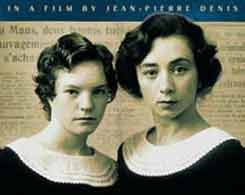|

Reviews of Recent Independent, Foreign, & Documentary Films
in Theaters and DVD/Home Video

MURDEROUS MAIDS
Directed by: Jean-Pierre Denis.
Produced by: Michèle & Laurent Pétin.
Written by: Jean-Pierre Denis & Michèle Halberstadt, based on the book, L'affaire Papin by Paulette Houdyer.
Director of Photography: Jean-Marc Fabre.
Edited by: Marie-Hélène Dozo.
Released by: Home Vision Entertainment.
Country of Origin: France. 94 min. Not Rated.
With: Sylvie Testud, Julie-Marie Parmentier & Isabelle Renauld.
DVD Special Features: Sylvie Testud Interview. Jean-Pierre Denis Interview. Trailers including The Maids (1974). Janet Flanner's 1933 Vanity Fair Article Recounting the Actual Events.
 Ignore the badly translated title. Based on the notorious murders of an upper-class mother
and daughter in 1933 Le Mans, France, director Jean-Pierre Denis methodically offers
an explanation of what would lead two convent educated sisters, Christine and Léa Petain, to
commit the brutal murders.
At a clipped paced, Denis depicts the elder Christineís strict education, her abandonment
by one sister to the Church, and, following in her motherís footsteps, her life as a maid,
where she is nameless and taken for granted. After being fired for talking back to a
mistress, Christine lands a position in the Lancelin household. Needing a skilled
seamstress, the madame (Renauld) hires the younger Petain sister, Léa, per Christineís
recommendation. Alone in their claustrophobic room at the top of the stairs, the sisters are a
world unto themselves. But noticing the rumpled sheets on only one of the two twin beds,
Madame Lancelin becomes suspicious. With smooth transitions - a torrid sex scene
precedes a scene set during Mass where Christine prays for Godís blessing for herself and
her sister - the buildup to the gruesome killings is riveting. As Christine, Sylvie Testud, is nothing less
than ferocious (she won a César Award, the French Oscar, for her performance).
Even in her stillness, sheís compelling. Julie-Marie Parmentier more than holds her own as
her impressionable child-like sister. And the filmís view of the class system is much
more complex than the prosecutionís pat explanation offered at their trial. Ignore the badly translated title. Based on the notorious murders of an upper-class mother
and daughter in 1933 Le Mans, France, director Jean-Pierre Denis methodically offers
an explanation of what would lead two convent educated sisters, Christine and Léa Petain, to
commit the brutal murders.
At a clipped paced, Denis depicts the elder Christineís strict education, her abandonment
by one sister to the Church, and, following in her motherís footsteps, her life as a maid,
where she is nameless and taken for granted. After being fired for talking back to a
mistress, Christine lands a position in the Lancelin household. Needing a skilled
seamstress, the madame (Renauld) hires the younger Petain sister, Léa, per Christineís
recommendation. Alone in their claustrophobic room at the top of the stairs, the sisters are a
world unto themselves. But noticing the rumpled sheets on only one of the two twin beds,
Madame Lancelin becomes suspicious. With smooth transitions - a torrid sex scene
precedes a scene set during Mass where Christine prays for Godís blessing for herself and
her sister - the buildup to the gruesome killings is riveting. As Christine, Sylvie Testud, is nothing less
than ferocious (she won a César Award, the French Oscar, for her performance).
Even in her stillness, sheís compelling. Julie-Marie Parmentier more than holds her own as
her impressionable child-like sister. And the filmís view of the class system is much
more complex than the prosecutionís pat explanation offered at their trial.
Extras: The 1933 Vanity Fair article is the most interesting extra, noting that sapphic references were ignored during the trial, as well as that the real-life
Madame Lancelin never spoke to her maids, but communicated only by notes. KT
November 9, 2003
HomeAbout
Film-Forward.com Archive of Previous Reviews
|

